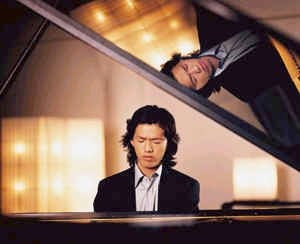 With the proliferation of piano competitions, it’s easy to become jaded at the prospect of yet another young virtuoso passing through town, making his or her on a hopefully enthusiastic public. But media darling (although we all regret this picture ever having been taken)Yundi Li, the first Chinese national to win the prestigious Chopin Competition (2000, the first impressive crop in 25, 30 years - Alex Kobrin came in third that year, jfl wants to know where Ms. Ingrid Fliter is, these days), is definitely a cut above, as he proved Saturday night at Strathmore.
With the proliferation of piano competitions, it’s easy to become jaded at the prospect of yet another young virtuoso passing through town, making his or her on a hopefully enthusiastic public. But media darling (although we all regret this picture ever having been taken)Yundi Li, the first Chinese national to win the prestigious Chopin Competition (2000, the first impressive crop in 25, 30 years - Alex Kobrin came in third that year, jfl wants to know where Ms. Ingrid Fliter is, these days), is definitely a cut above, as he proved Saturday night at Strathmore.F. Liszt, h-moll Sonate, Yundi Li Schumann, Scarlatti, Mozart, Liszt: Vienna Recital, Yundi Li |
The Liszt sonata, arguably the summit of Liszt’s piano music, is a through-composed piece complete with leitmotifs and, properly performed, a tight cohesive dramatic narrative, including a fugue (can’t beat a good Romantic fugue) and mordant fade-out conclusion. In one light it is almost a Ring-of-the-Nibelungen in miniature, and indeed Wagner was a big fan. Most of this was told beautifully in Yundi Li’s performance (he has also recorded it for Deutsche Grammophon – an well developed yet exciting reading –Ed.jr.), with not a dull moment and only a bit of that virtuoso overdrive that can – occasionally – divert attention from the music and towards the musician. Much like the Schumann, here was excellence bound to mature into something better, still.
In a way, though, Yundi Li’s opening Mozart sonata, C-major K. 330, gave the best idea of the kind of artist he will become. Mid-mature Mozart, the sonata is indeed ‘lighthearted’ as the program notes claim, but it is not light music. Yundi gave it a wonderful flow and clarity, never becoming either too precious or too pretentious. The central episode of the Andante had a fine lyricism, and the concluding Allegretto recalled the operatic Mozart in his hands.
Stephen Brookes, In This Corner, Yundi Li (Washington Post, April 3) |
It is good to hear this great talent is making an impression and it is good to see his artistic growth tracked. Thanks for the Review, Ionarts.
ReplyDelete